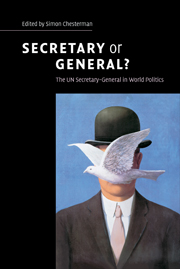Book contents
- Frontmatter
- Contents
- Contributors
- Foreword
- Acknowledgements
- Introduction: secretary or general?
- PART I Defining and refining the job description
- PART II Maintaining peace and security
- PART III Normative and political dilemmas
- PART IV Independence and the future
- APPENDIX: selected documents on the Secretary-General
- 1 Charter of the United Nations, 26 June 1945
- 2 Report of the Preparatory Commission of the United Nations, 23 December 1945
- 3 General Assembly Resolution 11(I), 24 January 1946
- 4 The “Wisnumurti Guidelines” for Selecting a Candidate for Secretary-General, 12 November 1996
- 5 General Assembly Resolution 51/241, 22 August 1997
- 6 Canadian Non-Paper on the Process for the Selection of the Next Secretary-General, 15 February 2006
- 7 General Assembly Resolution 60/286, 8 September 2006
- Select bibliography
- Index
6 - Canadian Non-Paper on the Process for the Selection of the Next Secretary-General, 15 February 2006
Published online by Cambridge University Press: 06 January 2010
- Frontmatter
- Contents
- Contributors
- Foreword
- Acknowledgements
- Introduction: secretary or general?
- PART I Defining and refining the job description
- PART II Maintaining peace and security
- PART III Normative and political dilemmas
- PART IV Independence and the future
- APPENDIX: selected documents on the Secretary-General
- 1 Charter of the United Nations, 26 June 1945
- 2 Report of the Preparatory Commission of the United Nations, 23 December 1945
- 3 General Assembly Resolution 11(I), 24 January 1946
- 4 The “Wisnumurti Guidelines” for Selecting a Candidate for Secretary-General, 12 November 1996
- 5 General Assembly Resolution 51/241, 22 August 1997
- 6 Canadian Non-Paper on the Process for the Selection of the Next Secretary-General, 15 February 2006
- 7 General Assembly Resolution 60/286, 8 September 2006
- Select bibliography
- Index
Summary
Introduction
The existing selection process for the post of Secretary-General of the United Nations has produced several distinguished Secretaries-General. But the lack of transparency and inclusiveness of the exercise has become increasingly noticeable, and the UN process compares poorly with the practices of some other international organizations.
The Charter of the United Nations (art. 97) specifies that “the Secretary-General shall be appointed by the General Assembly upon the recommendation of the Security Council.” In practice, the Security Council nominates a single candidate who is then endorsed by the General Assembly. No list of qualifications is agreed, no formal screening takes place, and the GA membership is asked to declare itself on the nominated candidate without the benefit of relevant information or even informal consultations. The candidate's vision for the UN's future and programme of action for the UN Secretariat remain unexamined, and there is no established way for the member states to develop a sense of the candidate's skills in key areas like communication and political leader-ship.
At a time when member states are discussing the reform and renewal of so many aspects of the UN, it seems entirely appropriate that we should critically examine the way in which we choose the person who will serve as the organization's leader. This non-paper offers preliminary suggestions for a more transparent and open selection process aimed at ensuring that individuals with the right temperament, talents and judgement are identified and submitted to the General Assembly for consideration.
- Type
- Chapter
- Information
- Secretary or General?The UN Secretary-General in World Politics, pp. 254 - 259Publisher: Cambridge University PressPrint publication year: 2007



